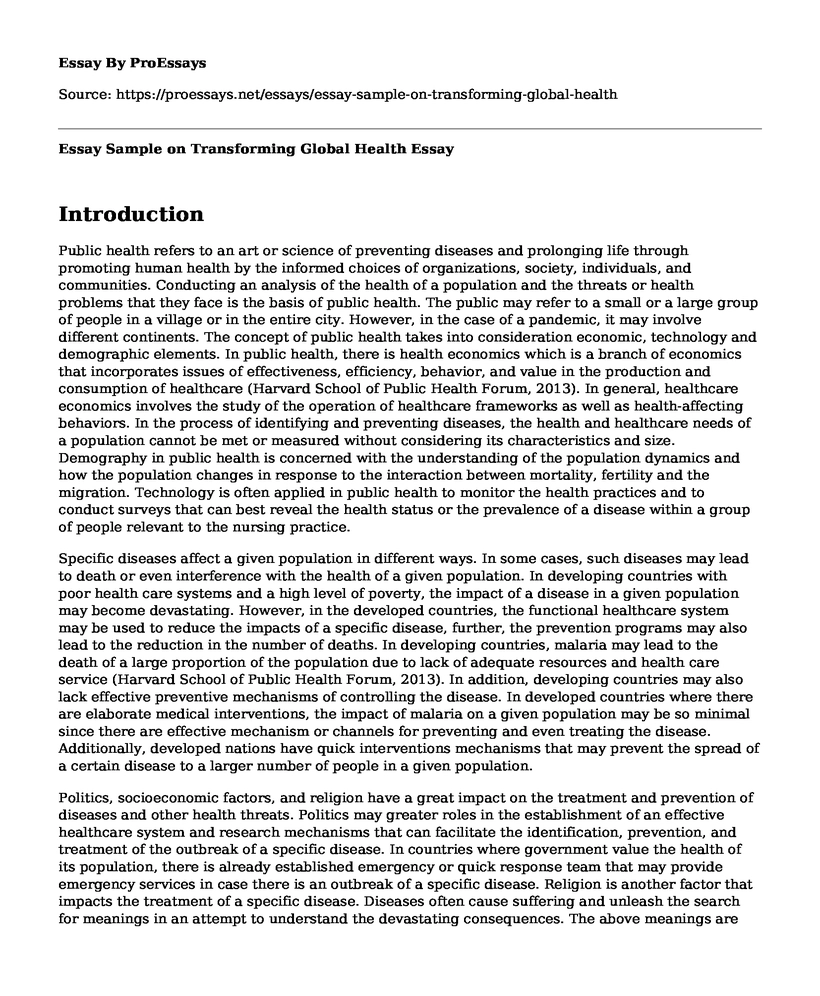Introduction
Public health refers to an art or science of preventing diseases and prolonging life through promoting human health by the informed choices of organizations, society, individuals, and communities. Conducting an analysis of the health of a population and the threats or health problems that they face is the basis of public health. The public may refer to a small or a large group of people in a village or in the entire city. However, in the case of a pandemic, it may involve different continents. The concept of public health takes into consideration economic, technology and demographic elements. In public health, there is health economics which is a branch of economics that incorporates issues of effectiveness, efficiency, behavior, and value in the production and consumption of healthcare (Harvard School of Public Health Forum, 2013). In general, healthcare economics involves the study of the operation of healthcare frameworks as well as health-affecting behaviors. In the process of identifying and preventing diseases, the health and healthcare needs of a population cannot be met or measured without considering its characteristics and size. Demography in public health is concerned with the understanding of the population dynamics and how the population changes in response to the interaction between mortality, fertility and the migration. Technology is often applied in public health to monitor the health practices and to conduct surveys that can best reveal the health status or the prevalence of a disease within a group of people relevant to the nursing practice.
Specific diseases affect a given population in different ways. In some cases, such diseases may lead to death or even interference with the health of a given population. In developing countries with poor health care systems and a high level of poverty, the impact of a disease in a given population may become devastating. However, in the developed countries, the functional healthcare system may be used to reduce the impacts of a specific disease, further, the prevention programs may also lead to the reduction in the number of deaths. In developing countries, malaria may lead to the death of a large proportion of the population due to lack of adequate resources and health care service (Harvard School of Public Health Forum, 2013). In addition, developing countries may also lack effective preventive mechanisms of controlling the disease. In developed countries where there are elaborate medical interventions, the impact of malaria on a given population may be so minimal since there are effective mechanism or channels for preventing and even treating the disease. Additionally, developed nations have quick interventions mechanisms that may prevent the spread of a certain disease to a larger number of people in a given population.
Politics, socioeconomic factors, and religion have a great impact on the treatment and prevention of diseases and other health threats. Politics may greater roles in the establishment of an effective healthcare system and research mechanisms that can facilitate the identification, prevention, and treatment of the outbreak of a specific disease. In countries where government value the health of its population, there is already established emergency or quick response team that may provide emergency services in case there is an outbreak of a specific disease. Religion is another factor that impacts the treatment of a specific disease. Diseases often cause suffering and unleash the search for meanings in an attempt to understand the devastating consequences. The above meanings are coupled to the beliefs and are inserted in the histories of faith and in the understanding of the sacred (Harvard School of Public Health Forum, 2013). Through religion, one is able to understand the origin of disease and even preventive mechanisms. Social economic status is one of the socioeconomic factors that determine the treatment and prevention of disease. With high poverty level as experienced in the developing countries, there is a high likelihood of spread of certain diseases within a population.
Reference
Harvard School of Public Health Forum (2013). Transforming Global Health: A New Vision for the Future | The Forum at HSPH [Motion Picture].
Cite this page
Essay Sample on Transforming Global Health. (2022, Nov 15). Retrieved from https://proessays.net/essays/essay-sample-on-transforming-global-health
If you are the original author of this essay and no longer wish to have it published on the ProEssays website, please click below to request its removal:
- Vaccinations Pros and Cons Essay
- Methodology of Research on How Weight, Food Preference, and Exercise Influence Hypertension
- Effects of Social Media on Physical and Mental Health Essay
- Pediatric Nurse Practitioner - Admission Essay
- Emergency Management of "Deep Horizon" Event
- Accuracy in Dental Implantology: The Challenge of Precision - Essay Sample
- Ensuring Financial Improvements in Reimbursement: Drintin Hospital - Essay Sample







